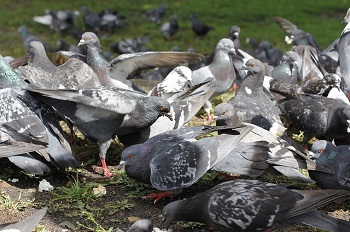Pigeon (Kurciya) and its Environmental Activities

By Obiabin Onukwugha and Ngozi Eyeh
Pigeons, often referred to as rock doves, are a type of bird that belongs to the family Columbidae. Known as “Kurciya” to the Hausas, pigeons come in various colors and patterns, but generally have a stout body with relatively short legs and a small head. Their distinctive cooing sound, varies among different species.
“Kurciya” are highly adaptable making it possible for it to be domesticated. It can also be found in a wide range of habitats, including cities, towns, farmlands, and rocky cliffs.
Pigeons are also known for their ability to navigate long distances and find their way home, which made them serve as messengers in various cultures and historical events.
We were told that during the ancient flood that covered the whole universe, the pigeon played a crucial role in the Ark.
According to the story told in Genesis 7 and 8, a specie of the pigeon, dove, was employed as messenger by Noah to ascertain if the flood waters had dried up.
The dove sent out by Noah returned, but with a bit of olive leaf caught in her beak. This was hard evidence, for Noah, that the earth was dry enough that plant life had once again begun to grow.
After another seven days, Noah sent out another dove. This one never came back. She was the first occupant of the ark to find a home back in the outside world. For Noah and the others, that meant it was time to start planning to disembark and begin life over again.
Sailors are said to use this trick since then to find dry land. It is believed that birds which came back did so because they were too far from a place to comfortably rest.
The Yoruba call it “Ẹyẹle”. In ancient story telling, Ẹyẹle” teaches us of mutual benefit. It was said that the pigeon once provided shelter and protection to an ant during a storm. The ant later helped the pigeon by warning it about a hunter.
Called ‘Kpalakwukwu”, in Igbo, pigeons are also associated with peace and have been used as symbols of peace in various cultures. The white dove is a common symbol of peace.
In Nigeria for instance, white doves are released to the air by the President or relevant authority during important national ceremonies, signalling peace for the country.
The “Kpalakwukwu” are monogamous and usually mate for life. Those not domesticated build simple nests, often in elevated places such as ledges, rooftops, or tree branches. During reproduction the pigeon lay two eggs, which takes about 14 days to hatch and both parents take turns incubating them.
Also known to the Ibibios as “Ibiom”, pigeons are primarily herbivores, feeding on seeds, grains, and sometimes small insects.
By feeding on various seeds and grains, the “Ibiom” plays a role in seed dispersal. Also, by consuming seeds and later excreting them in different locations, “Ibiom” help with plant regeneration and diversity.
In some societies, pigeons and other birds are used to clean up streets and public spaces by eating small scraps of food left behind by humans. This role helps reduce litter and the presence of potential pests.
The “Ibiom” are also a part of the local urban wildlife, as their presence can contribute to urban biodiversity. Their nesting sites and foraging activities provides habitat and food sources for other species, such as insects and small mammals.
Furthermore, the presence and behavior of pigeons in urban areas can serve as indicators of environmental health. If pigeon populations are thriving, it can suggest a relatively stable urban ecosystem. Conversely, if pigeon populations decline, it may indicate environmental issues that need attention.
“Eekumude” as the Odual tribe call it are however, not endangered and are considered a species of least concern in terms of conservation, according to researchers.
It is important to note however that “Eekumude” can also be considered pests in certain situations due to concerns about their droppings, which can accumulate on buildings and public spaces.
